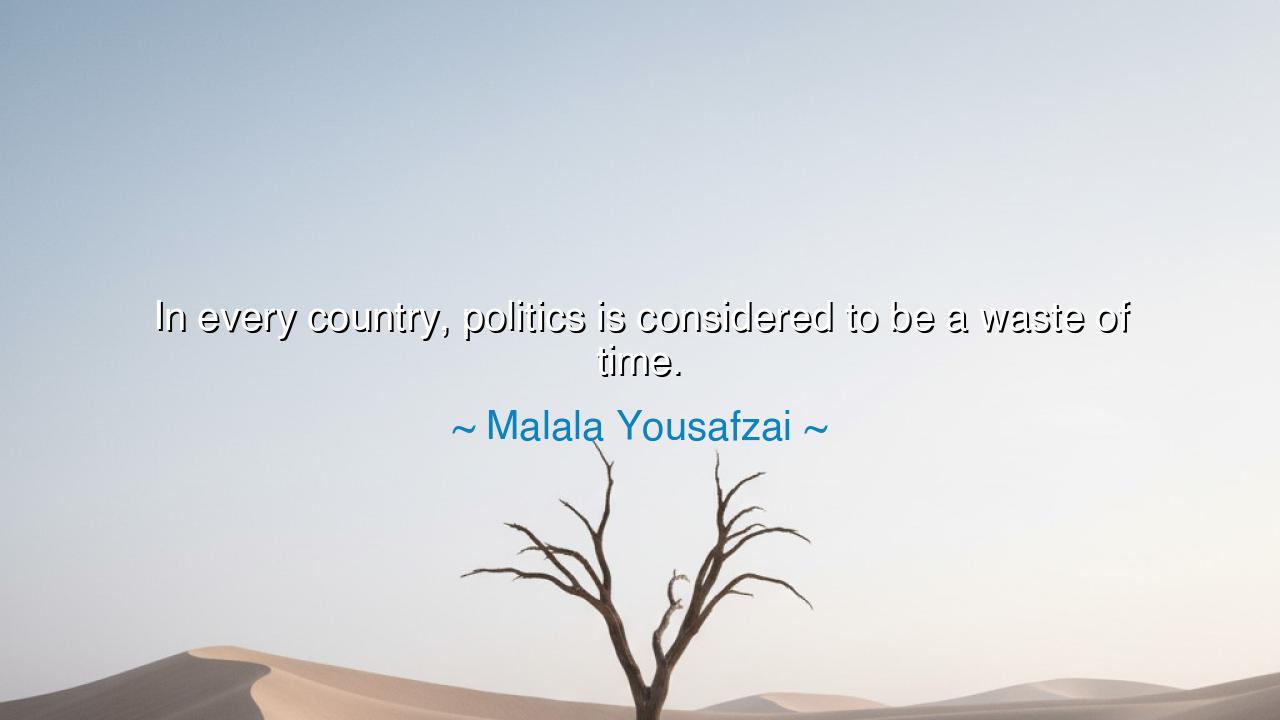
In every country, politics is considered to be a waste of time.






Hear the words of Malala Yousafzai, child of courage and voice of truth, who declared: “In every country, politics is considered to be a waste of time.” This is no idle remark, but a lament drawn from bitter experience, for she has seen how the quarrels of rulers too often eclipse the needs of the people. To many, politics is not a noble pursuit of justice but a theater of vanity, where promises echo but seldom touch the soil of reality.
For what is called politics should be the art of serving the people, the tending of the common good. Yet across nations, it has too often become a spectacle of division, where rivalries matter more than remedies, and where the suffering of the poor, the powerless, and the oppressed is drowned in endless debate. Thus do ordinary souls, weary of betrayal, call it a “waste of time,” for their lives remain unchanged while leaders chase shadows of power.
Consider the land of India under colonial rule. The British parliament spoke often of order and governance, yet famine struck the people again and again, while aid was delayed by endless political calculations. For the starving child, what use were speeches in halls of power? To them, such politics was indeed a waste, for their hunger required bread, not words. So too today, when leaders forget the urgency of human need, people turn away in despair.
Yet Malala’s voice is not only sorrow but also a call to renewal. If politics is seen as waste, it is because it has strayed from its true purpose. The task of leaders must be reclaimed: not to quarrel for pride, but to labor for education, for justice, for peace. She herself, once silenced by violence, rose not to condemn the world entirely, but to remind it of what must be restored—the politics of service, rooted in compassion.
Therefore, let this wisdom be passed on: do not abandon politics as worthless, but demand that it return to its sacred duty. When rulers remember the cries of the people, when laws uplift the downtrodden, when words give birth to deeds, then politics is no waste of time—it is the vessel of justice itself. Malala’s warning is a mirror to all nations: change the nature of politics, or else it will remain an empty game while humanity suffers.






HPHuan Phungk
Malala Yousafzai’s perspective on politics being a waste of time makes me wonder if there’s a way to reform the system so it’s more engaging and effective for ordinary people. Politics can often seem like a distant and inaccessible realm. If even someone as powerful as Malala feels this way, what does it say about how disconnected politicians are from the needs of the people? How can we make political participation feel like a worthwhile investment?
DDDinh Dien
Malala’s comment seems to touch on the universal sense of disillusionment that many people feel towards politics. With so many problems in the world, it can seem like nothing changes despite all the political talk. But does this mean we should give up on it? Can real change happen if we all turn our backs on politics, or is there a way to shift the system so that it works for everyone?
Vvy
I find it intriguing that Malala sees politics as a waste of time, especially given her advocacy for education and rights. While it's easy to be disillusioned by the state of politics, can we afford to disengage? Are there examples of politics actually making a positive difference, or has it become too corrupt and disconnected from the real issues? I’d love to hear if others believe there’s a way to make politics matter again.
MNthi Mo nguyen
Malala Yousafzai's statement seems to reflect a deep frustration with the political systems in many countries. It's true that politics can often feel like a circus, filled with inefficiency and self-interest. But is it fair to dismiss politics entirely? How do we ensure that people, especially young people, are encouraged to engage with politics in a meaningful way, even if the system seems flawed? Can we make politics less of a 'waste of time' and more about real change?